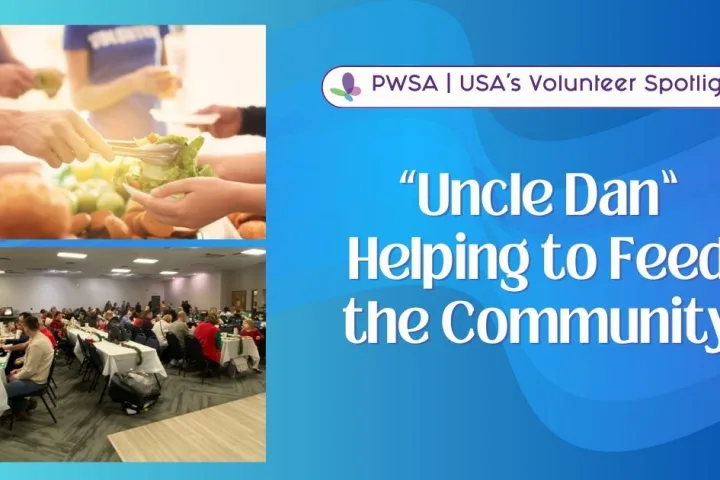Summer is well underway, and parts of the U.S. are experiencing extreme temperatures and high heat index warnings. While these conditions can pose a threat to anyone, they especially put our loved ones with PWS at risk for heat stroke and heat exhaustion. Due to the dysfunction of the hypothalamus, Individuals with PWS struggle to regulate their body temperature. We must use serious caution with our loved ones in the heat, especially in the potentially dangerous conditions that parts of the country have been experiencing.
Here are several ways to keep your loved one safe:
- *Plan activities for early morning or evening when it’s cooler
- *Use hats, umbrellas, and portable fans
- *Always wear sunscreen
- *Keep frozen water bottles handy
- *Stay hydrated
- *Let the car cool down before getting in
- *Wear light, loose-fitting clothing
- *Take frequent breaks
- *Find cool places to rest
- *Use cooling vests, towels, and gel pads
Symptoms of Heat Exhaustion:
Heat exhaustion is serious and often presents with heavy sweating, rapid pulse, dizziness, fatigue, cool and moist skin with goosebumps, muscle cramps, nausea, and headache. These symptoms might be less apparent in those with PWS, so watch for red cheeks, exhaustion, and fatigue. Rapidly cool an overheated person by moving them to a cool area, removing most clothing, and using wet towels on key areas like the neck, underarms, and groin. Ensure they sip the coldest beverage available for maximum hydration. Heat stroke is an emergency, marked by stopped sweating and possible confusion or collapse—call 911 immediately and continue all cooling efforts. Stay vigilant and keep your loved ones safe in the heat.
Stay Hydrated:
Keeping our loved ones hydrated can also be a challenge, one with detrimental effects. If fluid intake is an issue, consider a drink schedule. Would your loved one be more motivated to drink water if they had to finish a glass before their meal? Many people with PWS are more likely to drink water if there is a bit of flavoring. Avoid sugary juices and sweeteners and opt for squeezes of lemon or lime. Cucumber slices and mint leaves also add a nice flavor, along with the benefits of being hydrating as well.
If you have any additional questions, please don’t hesitate to contact our Family Support Team at (941) 312-0400 or email info@pwsausa.org.
Share this!





 Perry A. Zirkel has written more than 1,500 publications on various aspects of school law, with an emphasis on legal issues in special education. He writes a regular column for NAESP’s Principal magazine and NASP’s Communiqué newsletter, and he did so previously for Phi Delta Kappan and Teaching Exceptional Children.
Perry A. Zirkel has written more than 1,500 publications on various aspects of school law, with an emphasis on legal issues in special education. He writes a regular column for NAESP’s Principal magazine and NASP’s Communiqué newsletter, and he did so previously for Phi Delta Kappan and Teaching Exceptional Children. Jennifer Bolander has been serving as a Special Education Specialist for PWSA (USA) since October of 2015. She is a graduate of John Carroll University and lives in Ohio with her husband Brad and daughters Kate (17), and Sophia (13) who was born with PWS.
Jennifer Bolander has been serving as a Special Education Specialist for PWSA (USA) since October of 2015. She is a graduate of John Carroll University and lives in Ohio with her husband Brad and daughters Kate (17), and Sophia (13) who was born with PWS. Dr. Amy McTighe is the PWS Program Manager and Inpatient Teacher at the Center for Prader-Willi Syndrome at the Children’s Institute of Pittsburgh. She graduated from Duquesne University receiving her Bachelor’s and Master’s degree in Education with a focus on elementary education, special education, and language arts.
Dr. Amy McTighe is the PWS Program Manager and Inpatient Teacher at the Center for Prader-Willi Syndrome at the Children’s Institute of Pittsburgh. She graduated from Duquesne University receiving her Bachelor’s and Master’s degree in Education with a focus on elementary education, special education, and language arts. Evan has worked with the Prader-Willi Syndrome Association (USA) since 2007 primarily as a Crisis Intervention and Family Support Counselor. Evans works with parents and schools to foster strong collaborative relationships and appropriate educational environments for students with PWS.
Evan has worked with the Prader-Willi Syndrome Association (USA) since 2007 primarily as a Crisis Intervention and Family Support Counselor. Evans works with parents and schools to foster strong collaborative relationships and appropriate educational environments for students with PWS. Staci Zimmerman works for Prader-Willi Syndrome Association of Colorado as an Individualized Education Program (IEP) consultant. Staci collaborates with the PWS multi-disciplinary clinic at the Children’s Hospital in Denver supporting families and school districts around the United States with their child’s Individual Educational Plan.
Staci Zimmerman works for Prader-Willi Syndrome Association of Colorado as an Individualized Education Program (IEP) consultant. Staci collaborates with the PWS multi-disciplinary clinic at the Children’s Hospital in Denver supporting families and school districts around the United States with their child’s Individual Educational Plan. Founded in 2001, SDLC is a non-profit legal services organization dedicated to protecting and advancing the legal rights of people with disabilities throughout the South. It partners with the Southern Poverty Law Center, Protection and Advocacy (P&A) programs, Legal Services Corporations (LSC) and disability organizations on major, systemic disability rights issues involving the Individuals with Disabilities Education Act (IDEA), Americans with Disabilities Act (ADA), and the federal Medicaid Act. Recently in November 2014, Jim retired.
Founded in 2001, SDLC is a non-profit legal services organization dedicated to protecting and advancing the legal rights of people with disabilities throughout the South. It partners with the Southern Poverty Law Center, Protection and Advocacy (P&A) programs, Legal Services Corporations (LSC) and disability organizations on major, systemic disability rights issues involving the Individuals with Disabilities Education Act (IDEA), Americans with Disabilities Act (ADA), and the federal Medicaid Act. Recently in November 2014, Jim retired.